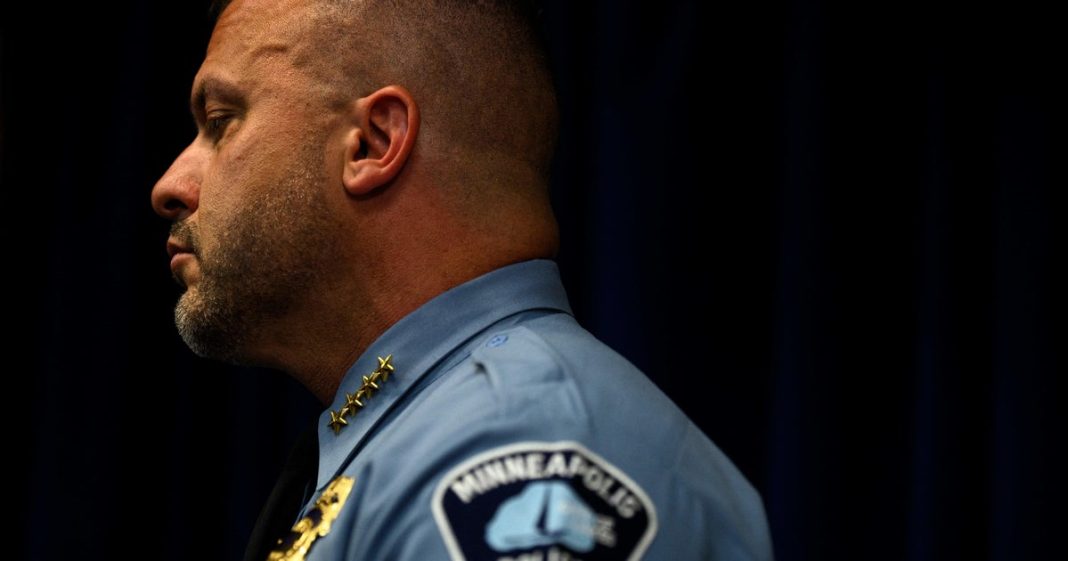Washington — The Justice Department said Wednesday that it is starting the process of dismissing lawsuits against police departments in Louisville, Kentucky, and Minneapolis, Minnesota, bringing an end to investigations launched during former President Joe Biden’s administration. It will also put an end to proposed accountability agreements with the departments.
The Trump administration said the consent decrees proposed by the Biden administration sought to subject the Louisville and Minneapolis police departments to sweeping terms that went beyond accusations of unconstitutional conduct and would have led to “years of micromanagement” of local departments.
The federal involvement began following the deaths of George Floyd at the hands of Minneapolis police and Breonna Taylor in a Louisville police shooting in 2020.
“Overbroad police consent decrees divest local control of policing from communities where it belongs, turning that power over to unelected and unaccountable bureaucrats, often with an anti-police agenda,” Assistant Attorney General Harmeet Dhillon, who leads the Justice Department’s Civil Rights Division, said in a statement. “Today, we are ending the Biden Civil Rights Division’s failed experiment of handcuffing local leaders and police departments with factually unjustified consent decrees.”
In addition to taking steps to dismiss the lawsuits against the Louisville and Minneapolis police departments, the Trump administration also said it is closing investigations into police departments in Phoenix; Trenton, New Jersey; Memphis; Mount Vernon, New York; Oklahoma City and the Louisiana State Police. The Trump administration said it is retracting the Biden administration’s findings of unconstitutional violations by all of the eight named departments, and is looking into potentially dismissing over a dozen other consent decrees across the country.
The Justice Department’s decision to drop the lawsuits against the Louisville and Minneapolis departments comes just days before the five-year mark since Floyd’s death. Derek Chauvin, a former Minneapolis police officer, was convicted in state court on murder and manslaughter charges for Floyd’s killing and went on to plead guilty in a federal civil rights case.
In a filing with the federal court in Minnesota in the case against the city of Minneapolis, Justice Department lawyers said that the government “will no longer prosecute this matter.”
“After an extensive review by current Department of Justice and Civil Rights Division leadership, the United States no longer believes that the proposed consent decree would be in the public interest,” the filing, signed by Dhillon and others, reads.
Consent decrees were used in federal investigations of law enforcement agencies during the Obama administration as part of a renewed commitment to civil rights issues and accountability in policing. But the Justice Department during the first Trump administration restricted their use. That policy was rescinded during the Biden administration. Then-Attorney General Merrick Garland subsequently opened the investigation into the Minneapolis Police Department.
Dhillon, the assistant attorney general, told reporters that consent decrees often set “unrealistic, idealistic expectations that are simply a recipe for non-compliance and perpetual consent decree hell for jurisdictions.” But she said if there was a “case of widespread, systemic racist or otherwise excessive-force situations happening despite training, despite litigation, despite local law enforcement taking these issues on,” consent decrees “might be an appropriate vehicle.”
“Theoretically, we are not ruling it out,” she added.
The yearslong examination by the Justice Department into the Minneapolis Police Department was launched in 2021, in the wake of Floyd’s death, and found that the Minneapolis Police Department disproportionately targeted Black and Native American people in law enforcement activity and used unjustified force in many instances.
The probe was undertaken to determine whether the department engaged in a “pattern or practice” of unconstitutional or unlawful policing. That civil investigation was separate from a federal criminal probe into Floyd’s death, which led to convictions of three Minneapolis police officers who were found to have failed to step in to stop Chauvin’s use of force against Floyd.
Investigators had recommended nearly 30 remedial measures and improvements for Minneapolis to implement to combat racial disparities and excessive use of force by the department, such as enhanced training and accountability measures, and improved data collection of police activity.
The city of Minneapolis and the Justice Department had entered into an agreement in principle to reach a court-authorized consent decree, which would have formalized the federal findings and recommendations, and appointed an independent monitor for the police department.
The Minneapolis City Council and Mayor Jacob Frey approved the terms of a court-enforceable consent decree in early January, which had to be approved by a federal judge before taking effect. The city has begun implementing the reforms laid out in the agreement and said it will continue to do so despite the Trump administration’s decision to dismiss the consent decree case.
“We’re doing it anyway,” Frey said in a statement. “We will implement every reform outlined in the consent decree—because accountability isn’t optional. Our independent monitor has lauded the meaningful progress we’ve made under the state settlement agreement, and the public can count on clear, measurable proof that our reforms are moving forward.”
As for the Louisville Police Department, the Justice Department’s investigation found that it, too, likely engaged in a pattern of conduct that violated citizens’ civil and constitutional rights. The Justice Department, city of Louisville and its police department reached an agreement in principle toward a consent decree.
Four Louisville Metro Police Department officers faced federal charges in connection with Taylor’s death in March 2020. Taylor, a 26-year-old EMT, was shot when officers stormed into her apartment while she was asleep with her boyfriend. Her boyfriend, who thought the officers were intruders, fired a handgun as they entered. The officers in response fired 22 shots into the apartment, and one struck Taylor in the chest.
But in announcing the decision to dismiss the lawsuits against the Minneapolis and Louisville police departments, the Justice Department under President Trump claimed they accused the agencies of engaging in patterns of unconstitutional policing by “wrongly equating statistical disparities with intentional discrimination and heavily relying on flawed methodologies and incomplete data.”
The Trump administration also said the consent decrees went too far and would have subjected the police departments to sweeping oversight.
“In short, these sweeping consent decrees would have imposed years of micromanagement of local police departments by federal courts and expensive independent monitors, and potentially hundreds of millions of dollars of compliance costs, without a legally or factually adequate basis for doing so,” the Justice Department said.
Dhillon said the agreements cost an average of $10 million a year and “should be a rare exception and not the norm.” She said “specifics of policing, policy, hiring, training, management, promotion and internal policies are best made at a local level, where there’s local accountability, and local control over funding and policy issues.”
Both Minneapolis and Louisville either already have consent decrees at the state level or are hiring their own monitors and taking actions on their own to ensure constitutional policing, Dhillon said, adding that the cities should save money thanks to the Justice Department’s decision.
“You can actually use that money, tens of millions of dollars, to hire more cops for your communities that will keep you safer than a partner at a big law firm in D.C. getting paid to monitor you,” Dhillon said.




